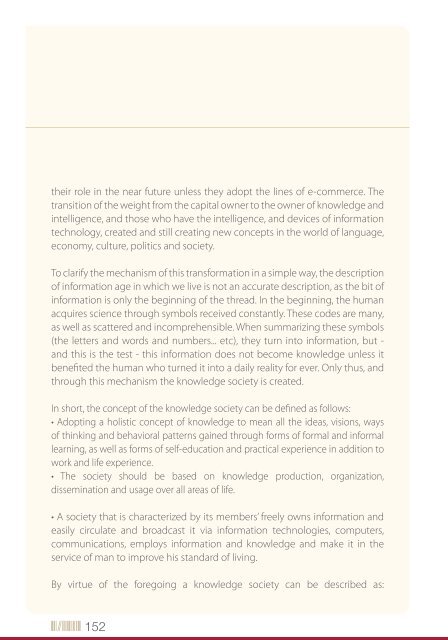General Supervisor
General Supervisor
General Supervisor
Create successful ePaper yourself
Turn your PDF publications into a flip-book with our unique Google optimized e-Paper software.
their role in the near future unless they adopt the lines of e-commerce. The<br />
transition of the weight from the capital owner to the owner of knowledge and<br />
intelligence, and those who have the intelligence, and devices of information<br />
technology, created and still creating new concepts in the world of language,<br />
economy, culture, politics and society.<br />
To clarify the mechanism of this transformation in a simple way, the description<br />
of information age in which we live is not an accurate description, as the bit of<br />
information is only the beginning of the thread. In the beginning, the human<br />
acquires science through symbols received constantly. These codes are many,<br />
as well as scattered and incomprehensible. When summarizing these symbols<br />
(the letters and words and numbers... etc), they turn into information, but -<br />
and this is the test - this information does not become knowledge unless it<br />
benefited the human who turned it into a daily reality for ever. Only thus, and<br />
through this mechanism the knowledge society is created.<br />
In short, the concept of the knowledge society can be defined as follows:<br />
• Adopting a holistic concept of knowledge to mean all the ideas, visions, ways<br />
of thinking and behavioral patterns gained through forms of formal and informal<br />
learning, as well as forms of self-education and practical experience in addition to<br />
work and life experience.<br />
• The society should be based on knowledge production, organization,<br />
dissemination and usage over all areas of life.<br />
• A society that is characterized by its members’ freely owns information and<br />
easily circulate and broadcast it via information technologies, computers,<br />
communications, employs information and knowledge and make it in the<br />
service of man to improve his standard of living.<br />
By virtue of the foregoing a knowledge society can be described as:<br />
152<br />
The society which is based on the production and dissemination of knowledge<br />
and using them efficiently in all areas of society activity: the economy, civil<br />
society, politics and private life, in order to achieve a sustainable social<br />
development.<br />
The elements of building a knowledge society:<br />
1. Knowledge:<br />
The building of a knowledge society requires three activities: knowledge<br />
production, dissemination, and dealing with it in resolving the issues of the<br />
society.<br />
The production of knowledge usually takes place in universities and research<br />
centers. In order for the production of knowledge to flourish its outcomes, it<br />
needs to be used by the various institutions of society, especially economic<br />
institutions. The search need not be reversed to the sterile process that does<br />
not contribute to the development process.<br />
The use of knowledge in resolving issues of the society is the only way to drive<br />
further production of knowledge.<br />
But knowledge is not only a result of the research It is also a result of mental<br />
operations performed by the individual to make the information he read<br />
about or heard of. These mental processes must be taught to all citizens since<br />
their childhood, whether in school or outside. The knowledge society must<br />
know how to classify information and associate them with each other and<br />
analyze, criticize them, and assemble them and synthesize them again until<br />
that information becomes knowledge which can be used to solve individual<br />
problems of daily life and also in building healthy relationships with others.<br />
This capability of reversing the scattered and unrelated information into<br />
153


